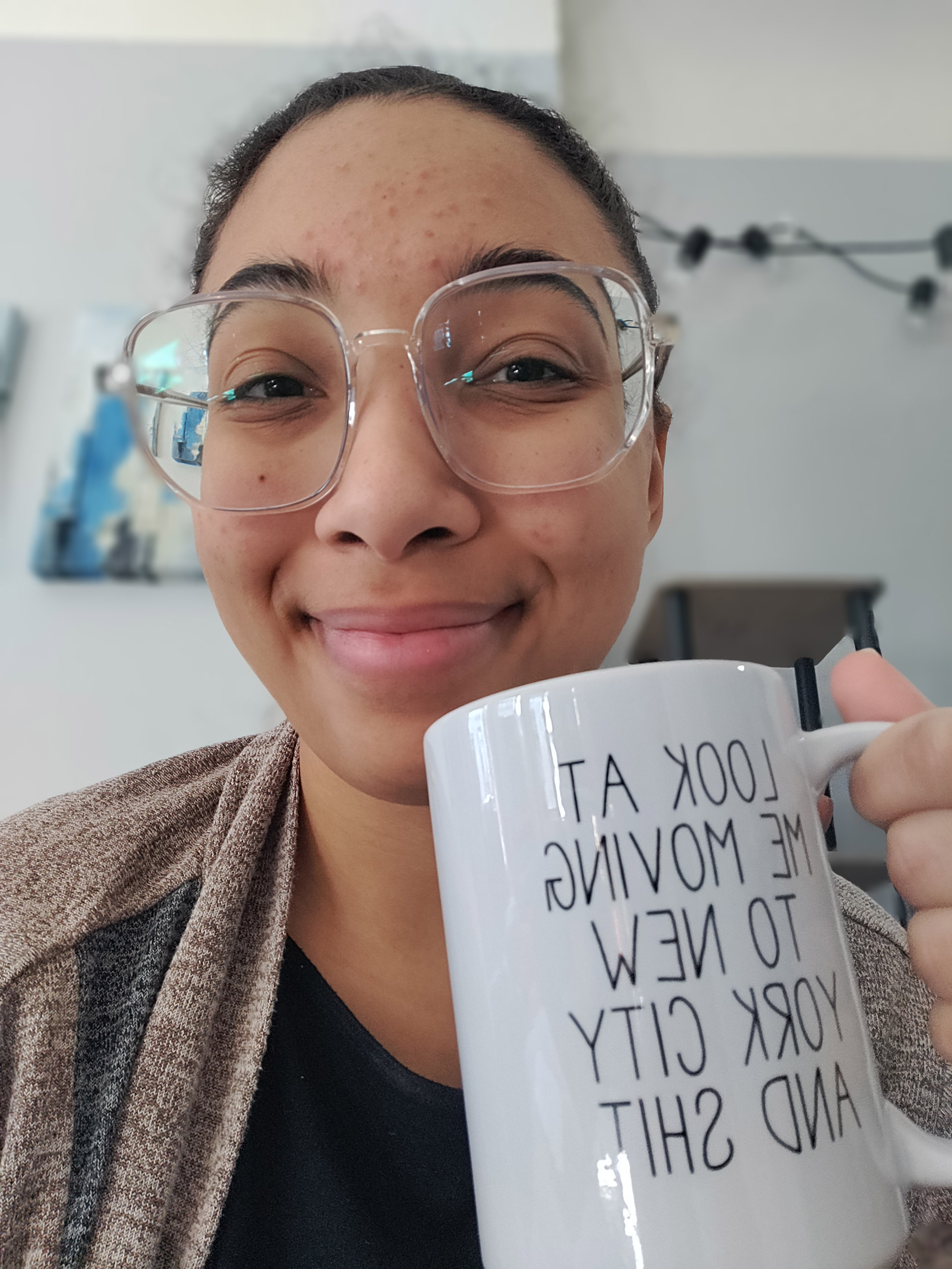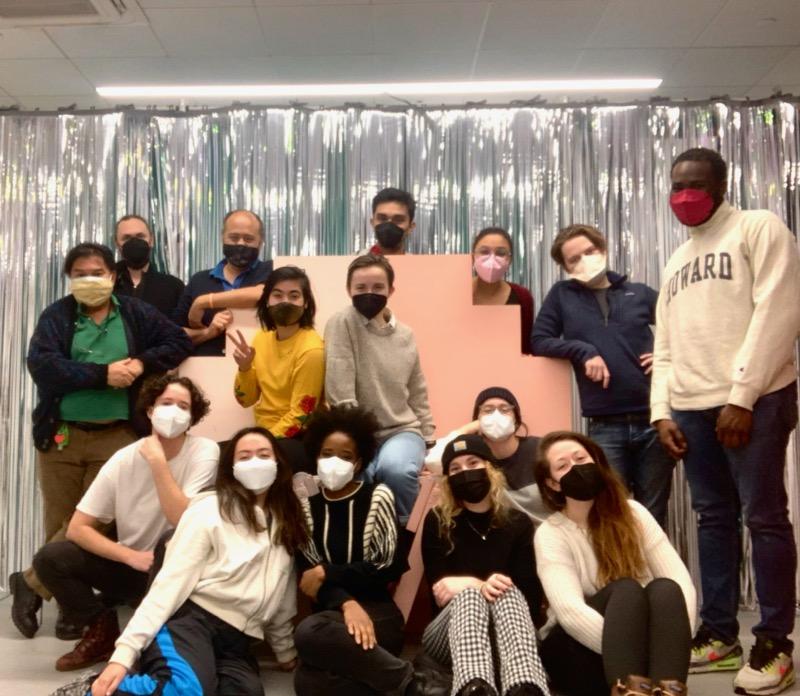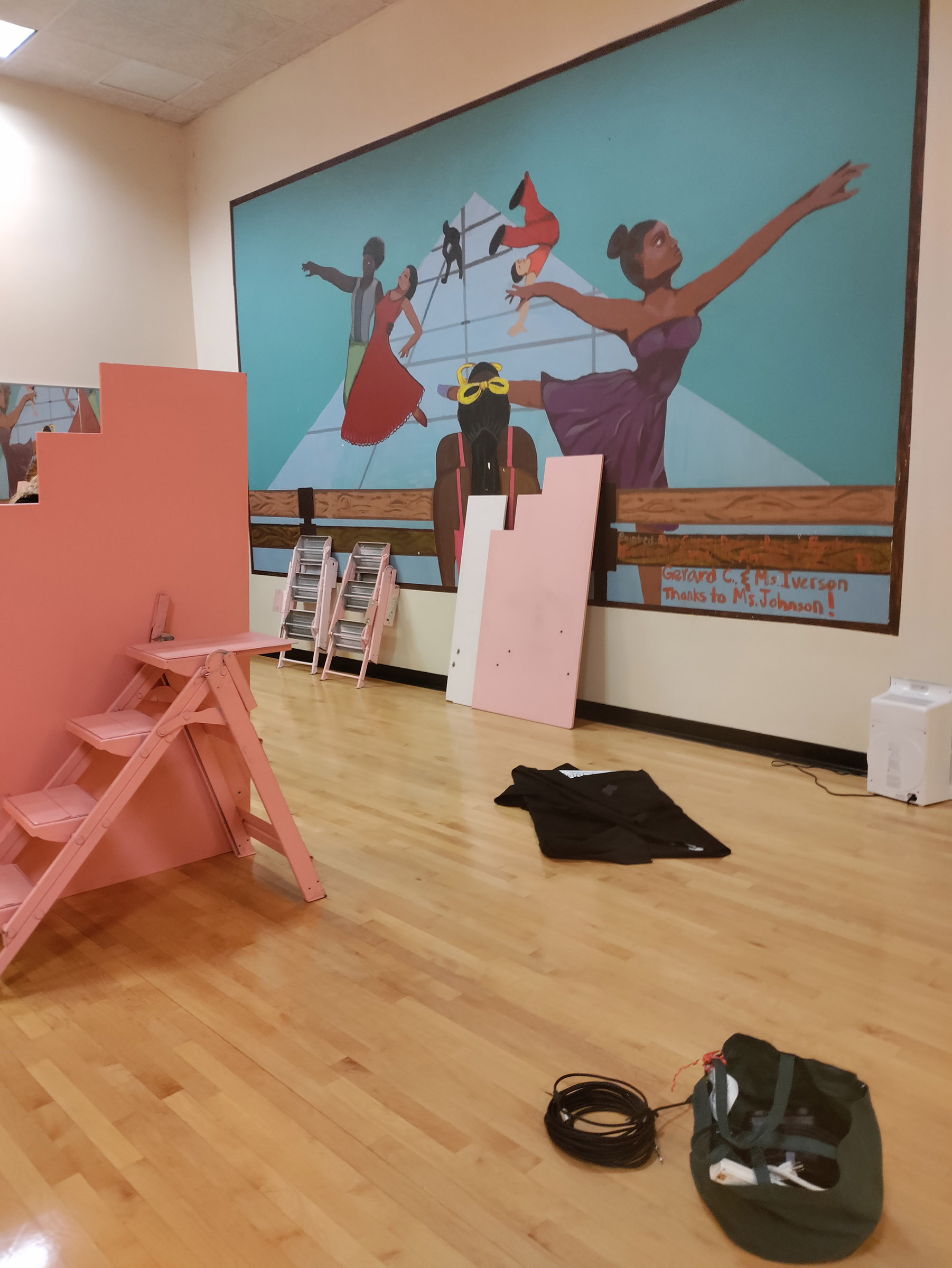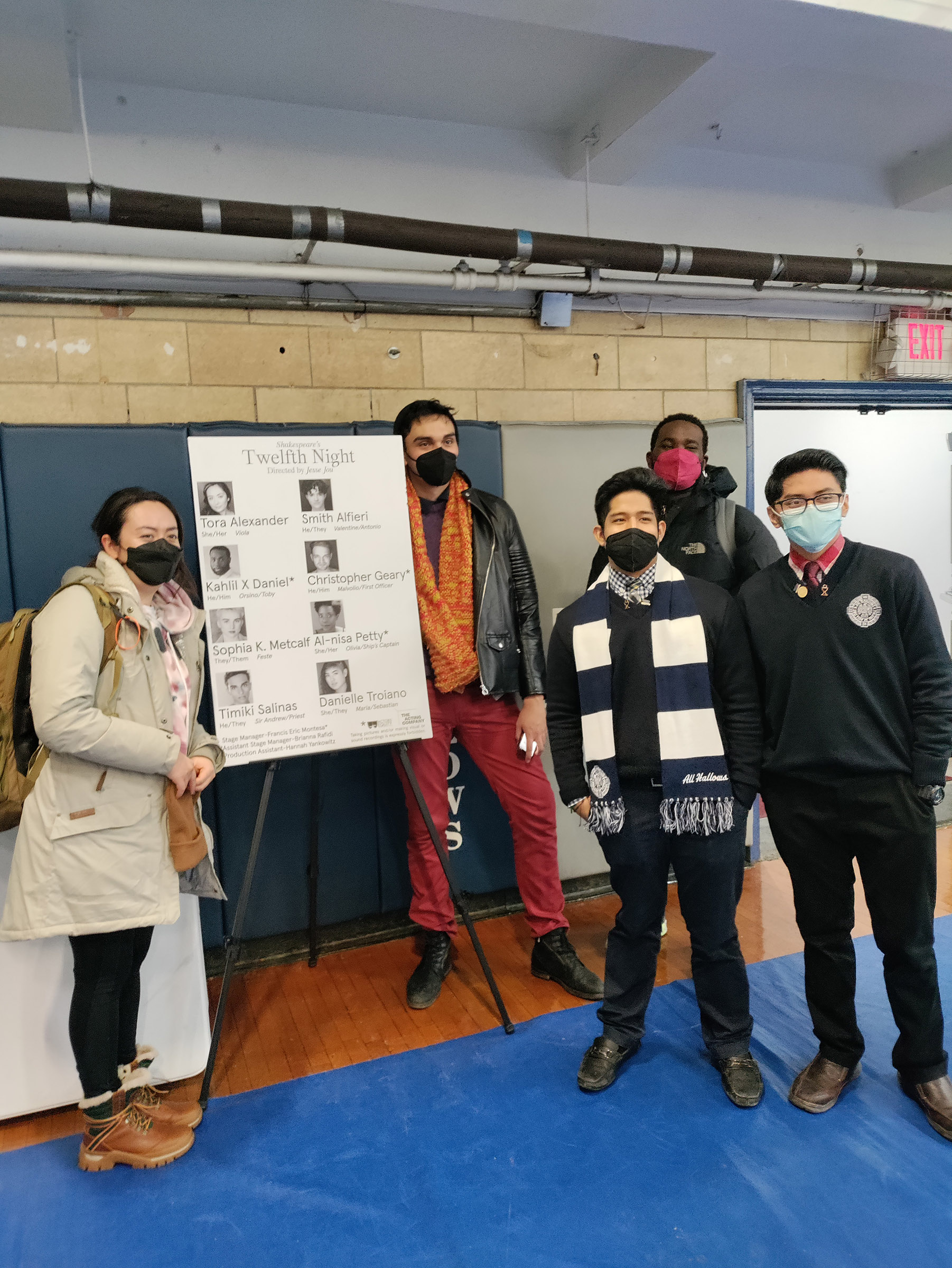
I am writing this on my plane ride back to Lubbock from New York City where I spent the past two months collaborating with School of Theatre and Dance professor, director Jesse Jou, on The Acting Company's educational tour of Shakespeare's Twelfth Night. Over the course of three weeks, we shared the performance with students from all five boroughs in New York, engaging areas where students face economic and social capital challenges. I experienced many incredible things during my time in NYC, from brilliantly choreographed musicals to challenging and witty plays to delectable restaurants. But the aspect of this adventure for which I am most grateful was the opportunity to see the bright smiling faces of black and brown middle and high school students witnessing a traveling Shakespeare show.
I am a Midwestern girl who grew up in predominantly conservative White spaces. I was a freshman in college before I had my first Black teacher. It wasn't until my final semester of graduate school that I would have my first Black male teacher. In terms of queer representation, I did not have a teacher who was openly a member of the LBGT+ community until I was in graduate school. When Jesse first spoke to me about his goals about the show, I was ecstatic to take this version of Shakespeare to students.
Twelfth Night is Shakespeare's most inherently queer play. It follows the story of Viola, a young woman who has been washed up on the shores of Illyria. She decides to dress as a man, change her name to Cesario, and become a servant to Duke Orsino who has been wooing the Countess Olivia. And thus, the love triangle begins. Orsino falls in love with someone who he thinks is a man, and Olivia falls in love with someone who is actually a woman. Once Viola's true identity is revealed at the end of the play, she stays in men's attire, and Orsino continues to refer to her as Cesario. It's queer. On top of that, there is the C-plot with the gay pirate, Antonio, who is in love with Sebastian, Viola's twin.
 Jesse leaned into this very queer-coded text and brought the students a deeply inclusive
show. For the casting breakdown, we made the language both specific to those goals
and open for diverse casting. We asked for auditions from transgender, nonbinary,
and otherwise genderqueer actors to bring specificity to this version of the play.
Although Shakespeare's pronouns were maintained, we invited actors of all genders
to audition and to bring the fullness of their gender identity to the enliven the
characters. We opened the world of Illyria by encouraging great ethnic and racial
diversity. The final cast fulfilled our goals of gender and racial diversity. Of the
eight members cast, there were two Black actors, two Asian actors, one Latinx actor,
and three white actors. Half of the actors identified as genderqueer and a fifth identified
as a member of the LGBT+ community.
Jesse leaned into this very queer-coded text and brought the students a deeply inclusive
show. For the casting breakdown, we made the language both specific to those goals
and open for diverse casting. We asked for auditions from transgender, nonbinary,
and otherwise genderqueer actors to bring specificity to this version of the play.
Although Shakespeare's pronouns were maintained, we invited actors of all genders
to audition and to bring the fullness of their gender identity to the enliven the
characters. We opened the world of Illyria by encouraging great ethnic and racial
diversity. The final cast fulfilled our goals of gender and racial diversity. Of the
eight members cast, there were two Black actors, two Asian actors, one Latinx actor,
and three white actors. Half of the actors identified as genderqueer and a fifth identified
as a member of the LGBT+ community.
The actors brought their full selves to the roles. The Black actor who played Toby and Orsino brought gospel and soul inspired singing. Another genderqueer actor embraced their identity to play the feminine Maria and the masculine Sebastian with such a beautiful life and clarity that I almost forgot they were only one person. On the first day of rehearsal, I overheard the two Asian actors--cast as the twins--say to each other, “I never imagined being able to be cast as a twin. I'm usually the only Asian in any cast.”
Touring to such a wide variety of schools was an unparalleled adventure. I went to public school growing up in a small town in Ohio. I had no idea what to expect from urban New York City public schools, but was excited to see how different audiences would react and relate to the story we were telling. Would the 6th graders understand the play? How were the students at the all-boys Catholic school going to handle the overtly queer content? What, exactly, was the demographic of these schools?
 Most of the students were BIPOC. According to New York City's Department of Education,
41% of public-school students are Hispanic, 25% are Black, and 16% are Asian. As of
2019, 56% of teachers in New York City public schools were White, a percentage that
was confirmed by my own interactions with the teachers. These students are not accustomed
to seeing people of color represented in leadership positions within their schools.
In my experiences, I never really had people who looked like me as role models. Although
I never felt explicitly excluded from spaces, I also often felt like I had to push
and force myself to be seen as intelligent, creative, and powerful. When I stood in
front of those students, talked to their teachers, led my team, and introduced the
company, I felt like I was speaking to a baby Kerstin and saying, “Look! You can do
it! There is space for you.” Through this performance, I hope we demonstrated to these
kids that they can be creative, intelligent, and powerful leaders. They can celebrate
and be successful not in spite of their skin and culture, but because of what they
can bring to the table.
Most of the students were BIPOC. According to New York City's Department of Education,
41% of public-school students are Hispanic, 25% are Black, and 16% are Asian. As of
2019, 56% of teachers in New York City public schools were White, a percentage that
was confirmed by my own interactions with the teachers. These students are not accustomed
to seeing people of color represented in leadership positions within their schools.
In my experiences, I never really had people who looked like me as role models. Although
I never felt explicitly excluded from spaces, I also often felt like I had to push
and force myself to be seen as intelligent, creative, and powerful. When I stood in
front of those students, talked to their teachers, led my team, and introduced the
company, I felt like I was speaking to a baby Kerstin and saying, “Look! You can do
it! There is space for you.” Through this performance, I hope we demonstrated to these
kids that they can be creative, intelligent, and powerful leaders. They can celebrate
and be successful not in spite of their skin and culture, but because of what they
can bring to the table.
More impactful than race was the embrace of the queer-coding of the show with a queer cast. Many of the students got excited and positively vocal when Malvolio made his drag queen entrance in his yellow stocking high-heeled boots. They were fully invested in the love stories between Orsino, Cesario, and Olivia, as well as the romance between Antonio and Sebastian. At one of the high schools in Brooklyn, there were three Black students in the front during a post-show talkback who clearly felt seen in new ways. Every time the actors spoke about gender, pronouns, or sexuality, they snapped and giggled, not in a mocking way, but in a way that said, “I'm young and awkward and nervous, but you really see me.” It was life-affirming to say the least.
I'm so incredibly grateful for this experience.
 Of course, it wasn't all warm fuzzies and rainbows. There were a lot of obstacles
to taking a show on the road and each venue had its own unique performance challenges.
A good deal of mental load was spent making sure the actors felt safe and healthy
in these COVID times. At one school, students had very traumatic backgrounds and significant
behavior problems which made finishing the performance impossible. That was a heartbreaking
day. All of this was on top of maintaining with my graduate coursework.
Of course, it wasn't all warm fuzzies and rainbows. There were a lot of obstacles
to taking a show on the road and each venue had its own unique performance challenges.
A good deal of mental load was spent making sure the actors felt safe and healthy
in these COVID times. At one school, students had very traumatic backgrounds and significant
behavior problems which made finishing the performance impossible. That was a heartbreaking
day. All of this was on top of maintaining with my graduate coursework.
I would do it all over again in a heartbeat because theatre is about sharing passion and love. And, for a brief moment, I shared my passion and love with these students, many of whom look like me. And that feeling of pride, purpose, and power will play on in me, and I hope those students, forever.
